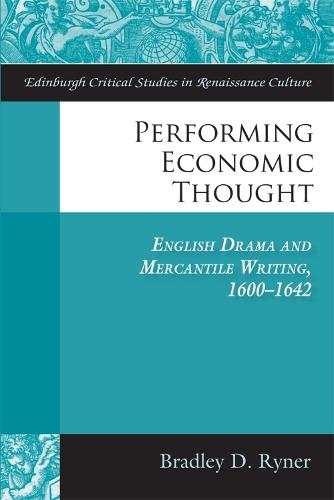Full Product Details
Author: Bradley Ryner (Assistant Professor, Arizona State University)
Publisher: Edinburgh University Press
Imprint: Edinburgh University Press
Dimensions:
Width: 15.60cm
, Height: 2.30cm
, Length: 23.40cm
Weight: 0.504kg
ISBN: 9780748684656
ISBN 10: 0748684654
Pages: 232
Publication Date: 17 December 2013
Audience:
Professional and scholarly
,
Professional & Vocational
Format: Hardback
Publisher's Status: Active
Availability: Manufactured on demand

We will order this item for you from a manufactured on demand supplier.
Reviews
Performing Economic Thought is an innovative investigation of theatrical technique and mercantilist discourse. Ryner provides lucid readings of dense economic treatises and cogent explications of demanding theoretical material. His objective of historicize the division between fact and fiction that has bought a privileged place for economics is important and ambitious. -- Amanda Bailey in Shakespeare Quarterly 66.3 (2015) I wish there were more books like Bradley D. Ryner's Performing Economic Thought... Ryner provides... a serious account of what literature and especially drama can do in the wider world of ideas. [...] This is the kind of book that speculatively inclined economists should (and could) read, and that every early modernist scholar of literature will want to sample. -- Roland Greene in SEL 55.2 (2015) Ryner has staked out his own turf in this excellent book: he treats seriously economic thought in Renaissance drama, and illuminates the formal qualities of plays that display that thought. In the end, he is successful in his project to compare the efficacy of mercantilists' economic models and playwrights' plays: while both attempt to link individual actions to their systemic effects, plays' more comprehensive, mediated and consciously constructed models successfully 'teach' audiences how to see complex socio-economic patterns and their consequences. -- Jill P. Ingram in Review of English Studies 66 (2015) Ryner ventures into well-travelled waters in Performing Economic Thought but happily he produces substantial returns on investment. Rather than approach the early modern 'business' of theatre in the manner of William Ingram and Melissa Aaron, or as a naturalizing representation of nascent capitalism a la Jean-Christophe Agnew or Richard Halpern, Ryner compares drama and mercantile writing between 1600 and 1642 as forms of knowledge. The result is compelling, well-documented, and lucidly written.... Performing Economic Thought... demonstrates that the early modern stage could produce new knowledge about economic discourse, especially that economic writing is itself performative. -- Aaron Kitch in Renaissance Studies 29.3 (2015)
Performing Economic Thought is an innovative investigation of theatrical technique and mercantilist discourse. Ryner provides lucid readings of dense economic treatises and cogent explications of demanding theoretical material. His objective of historicize the division between fact and fiction that has bought a privileged place for economics is important and ambitious. -- Amanda Bailey in Shakespeare Quarterly 66.3 (2015) I wish there were more books like Bradley D. Ryner's Performing Economic Thought... Ryner provides... a serious account of what literature and especially drama can do in the wider world of ideas. [...] This is the kind of book that speculatively inclined economists should (and could) read, and that every early modernist scholar of literature will want to sample. -- Roland Greene in SEL 55.2 (2015) Ryner has staked out his own turf in this excellent book: he treats seriously economic thought in Renaissance drama, and illuminates the formal qualities of plays that display that thought. In the end, he is successful in his project to compare the efficacy of mercantilists' economic models and playwrights' plays: while both attempt to link individual actions to their systemic effects, plays' more comprehensive, mediated and consciously constructed models successfully 'teach' audiences how to see complex socio-economic patterns and their consequences. -- Jill P. Ingram in Review of English Studies 66 (2015) Ryner ventures into well-travelled waters in Performing Economic Thought but happily he produces substantial returns on investment. Rather than approach the early modern 'business' of theatre in the manner of William Ingram and Melissa Aaron, or as a naturalizing representation of nascent capitalism a la Jean-Christophe Agnew or Richard Halpern, Ryner compares drama and mercantile writing between 1600 and 1642 as forms of knowledge. The result is compelling, well-documented, and lucidly written.... Performing Economic Thought... demonstrates that the early modern stage could produce new knowledge about economic discourse, especially that economic writing is itself performative. -- Aaron Kitch in Renaissance Studies 29.3 (2015)
Author Information
Bradley D. Ryner is an Assistant Professor of English at Arizona State University. His work has appeared in English Studies, Early Modern Literary Studies, and in various edited collections.



